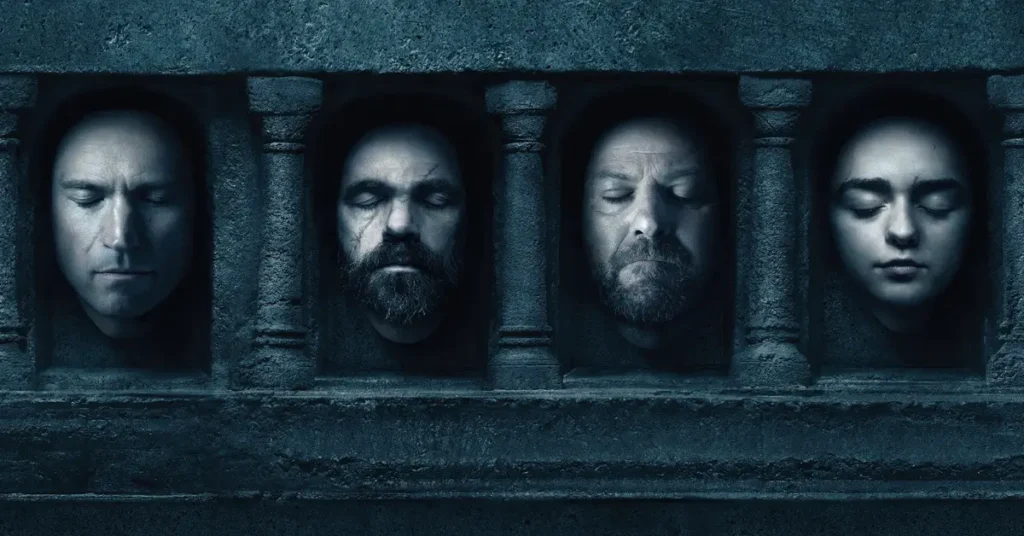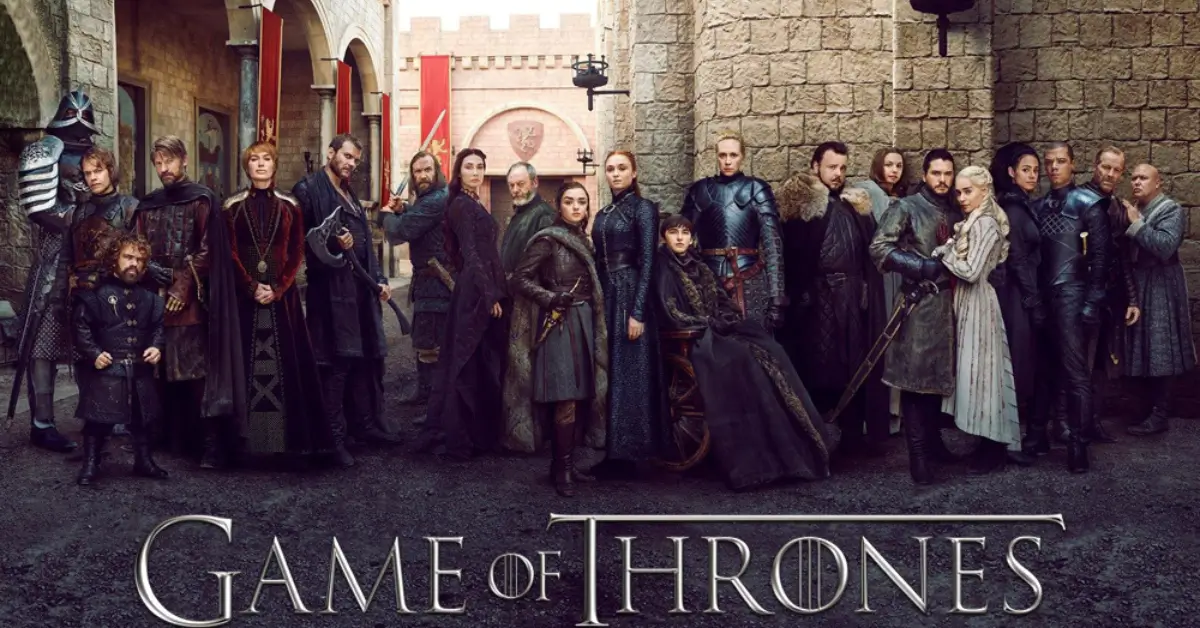Through the Mind’s Eye: Mental Health Themes in Game of Thrones
In the realm of epic television, few series have captivated global audiences quite like Game of Thrones. Beyond its dragons, political intrigue, and bloody battles lies a profound exploration of the human psyche. This analysis delves into how this groundbreaking series portrays various aspects of mental health, examining whether these depictions help or harm public perception of psychological struggles in our modern world.
Thank you for reading this post, don't forget to subscribe!Basic Series Information
Title: Game of Thrones
Release Years: 2011-2019
Showrunners: David Benioff and D.B. Weiss (Experienced in character-driven narratives, though without specific mental health specialization)
Based on: “A Song of Ice and Fire” by George R.R. Martin
Main Cast & Characters:
- Kit Harington (Jon Snow) – Portrays depression, PTSD
- Emilia Clarke (Daenerys Targaryen) – Exhibits trauma response, possible hereditary mental illness
- Lena Headey (Cersei Lannister) – Displays narcissistic traits, grief responses
- Peter Dinklage (Tyrion Lannister) – Shows depression, substance use as coping
- Sophie Turner (Sansa Stark) – Depicts trauma survival, resilience development
- Maisie Williams (Arya Stark) – Embodies dissociation, identity shifts
Genre: Fantasy drama with psychological elements
Awards: 59 Primetime Emmy Awards, numerous Golden Globes and other accolades
Rating: TV-MA (Mature themes, violence, explicit content)

Series Overview (Contains Some Spoilers)
General Summary:
Game of Thrones presents the power struggles among noble families in the fictional continents of Westeros and Essos. Against a backdrop of medieval fantasy, characters navigate political intrigue, warfare, and supernatural threats, all while managing their own psychological burdens.
Mental Health Themes:
The series explores numerous psychological conditions including:
- Post-traumatic stress disorder (PTSD)
- Depression and suicidal ideation
- Substance dependency
- Complex trauma and its aftermath
- Dissociative behaviors
- Paranoia and psychosis
- Grief and bereavement
- Identity dissolution and reformation
Key Mental Health Moments:
- Jon Snow’s depression following his resurrection
- Theon Greyjoy’s transformation into “Reek” through torture
- Cersei’s grief response after losing her children
- Daenerys’ gradual psychological deterioration
- Bran Stark’s personality shift after becoming the Three-Eyed Raven
Resolution Approaches:
Game of Thrones offers varying outcomes for characters’ mental health journeys. Some find resolution through revenge (Arya), others through acceptance of new identities (Bran), while some spiral into destructive ends (Daenerys). The series rarely provides traditional therapeutic resolution, instead showing how mental states influence fate in a world without modern psychological understanding.
Setting & Cinematic Techniques
Filming Environments:
The series uses environment as metaphor for mental states the icy Wall representing emotional numbness, the dungeons of King’s Landing embodying confinement of the mind, and the vast Dothraki Sea showing psychological isolation.
Cinematography:
The visual language of Game of Thrones directly connects to psychological themes:
- Desaturated color palettes for depressive episodes
- Claustrophobic framing during panic attacks
- Disorienting camera work during dissociative moments
- Contrast between warm interiors and harsh exteriors mirroring internal/external conflicts
Sound Design & Music:
Composer Ramin Djawadi masterfully uses score to enhance psychological elements:
- Repetitive, minimalist compositions during trauma flashbacks
- Discordant strings during psychotic breaks
- Long silences emphasizing psychological isolation
- Character-specific themes that evolve with their mental states

Acting & Character Portrayal
Performance Highlights:
The cast delivers remarkably nuanced portrayals of psychological distress. Particularly noteworthy are:
- Alfie Allen’s transformation as Theon/Reek, depicting complex trauma and identity dissolution
- Lena Headey’s portrayal of Cersei’s grief-driven vengeance
- Kit Harington’s depiction of Jon Snow’s depression following resurrection
- Peter Dinklage’s nuanced performance of Tyrion’s alcoholism as self-medication
Authenticity Assessment:
While operating in a fantasy setting, the series achieves surprising psychological realism in many aspects. The depictions of PTSD symptoms, grief responses, and dissociation align with clinical understanding, though sometimes accelerated for narrative purposes.
Mental Health Representation: Strengths & Weaknesses
Psychological Accuracy:
The series consulted with historians rather than psychologists, resulting in a mixed portrayal. The strengths lie in showing mental health issues as responses to extreme circumstances rather than character flaws. However, the medieval setting limits access to therapeutic interventions, potentially reinforcing the notion that mental illness leads inevitably to tragedy.
Stigmatization vs. Awareness:
Game of Thrones presents a complex picture while terms like “madness” are used (particularly regarding the Targaryen family), the narrative generally shows empathy toward psychological suffering. Characters experiencing mental health challenges are fully developed rather than reduced to their conditions.
Impact on Perception:
The series has sparked significant discussion about trauma responses and the psychological cost of violence. By placing these themes in a fantasy context, it creates a safe distance for viewers to examine difficult psychological concepts.
Critical Reception & Cultural Response
Critical Analysis:
Critics have praised the series’ unflinching look at psychological consequences of trauma and power. The final season received criticism for its rushed character development, particularly regarding Daenerys’ psychological decline, which some mental health advocates felt reinforced harmful stereotypes about mental illness and violence.
Audience Reaction:
Viewers with lived experience of trauma have both praised the series for its raw portrayal of psychological suffering and criticized its occasional use of mental illness as plot device. The “Targaryen madness” concept has been particularly controversial for its genetic determinism.
Cultural Impact:
Game of Thrones normalized discussions about psychological trauma in popular culture. Mental health professionals have used the series as a reference point when discussing concepts like PTSD, complex trauma, and dissociation with patients and the public.
Social Significance
Conversations Generated:
The series prompted numerous articles, podcasts, and online discussions analyzing characters through psychological lenses. Mental health professionals have referenced the show when explaining concepts to the public.
Influence on Television:
Game of Thrones helped establish a trend toward psychological depth in fantasy and historical dramas. Subsequent series have placed greater emphasis on mental health consequences of trauma and violence.
Mental Health Awareness:
While not explicitly aligned with mental health organizations, the series’ popularity has given advocates platforms to discuss psychological topics. Cast members, particularly Sophie Turner and Kit Harington, have spoken openly about their own mental health challenges during and after filming.
Personal Reflection
Game of Thrones offers profound insights into how extreme circumstances affect psychological well-being. The series excels at showing the complexity of trauma responses not everyone breaks, not everyone heals, and recovery paths vary dramatically depending on resources and support systems.
I would cautiously recommend the series to those struggling with mental health issues. While it provides powerful examples of resilience, its graphic content and sometimes hopeless outlook could be triggering for viewers actively dealing with trauma or depression. The series would benefit from content warnings and perhaps companion discussions about healthier coping mechanisms than those available in Westeros.
The portrayal could have been improved by:
- Showing more examples of healing and recovery alongside destruction
- Avoiding the genetic determinism of the “Targaryen madness” storyline
- Providing more nuance in the final season’s portrayal of psychological decline
Conclusion
Game of Thrones stands as a landmark television series that, perhaps unintentionally, created one of the most extensive explorations of mental health in popular entertainment. By placing psychological struggles within a fantasy context, it allowed millions of viewers to engage with difficult topics from a safe distance.
The series demonstrates that even in worlds with dragons and ice zombies, the most compelling stories remain deeply human those of minds struggling to cope with extraordinary circumstances. While imperfect in its portrayal, Game of Thrones has undeniably advanced public conversation about mental health, trauma, and resilience.
What are your thoughts on how Game of Thrones portrays mental health issues? Did you find particular character journeys illuminating or problematic? Share your perspective in the comments below.


